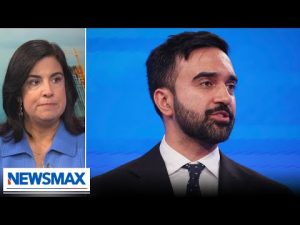In the political landscape of the United States, a notable storyline is emerging concerning Zoron Mandani, who is on track to become the next mayor of New York City. His recent comments during an interview with CNN raised eyebrows across the nation, particularly when he boldly declared his aversion to capitalism. This stance, especially coming from a candidate poised to lead one of the world’s financial epicenters, is enough to make anyone sit up and take notice.
Mandani’s rejection of capitalism isn’t just a casual opinion; it is part of a broader ideological identity as a democratic socialist. He evokes the words of Dr. Martin Luther King Jr. to support his views, stating that there must be “a better distribution of wealth for all of God’s children.” This framing suggests that Mandani sees himself as a champion for the underprivileged, focusing on income inequality rather than the economic system that has fueled the growth of New York City. Yet, one must wonder whether this assessment of capitalism as a nuisance rather than a driving force for prosperity is not only misguided but perhaps also dangerous.
Capitalism has created jobs, increased innovation, and lifted millions out of poverty. In New York City, it has transformed the skyline and shaped the economy. The very foundations of this city are built upon the principles of capitalism, which encourage competition, investment, and entrepreneurship. By dismissing this system outright, Mandani raises several red flags about his ability to navigate and manage the complex economic realities of the city. His lack of real-world job experience only amplifies these concerns. How can someone who has never held a steady job possibly understand the nuances required to lead a bustling metropolis?
Moreover, Mandani’s comments have the potential to alienate business owners, investors, and workers who thrive in a capitalist environment. Creating an atmosphere where people feel their hard work and entrepreneurial spirit could be undermined may stifle the very progress he claims to champion. It’s crucial to remember that economic growth and social equity need not be at odds; in fact, they can complement each other. A thriving economy can provide the resources necessary for social programs aimed at combating poverty and inequality.
What makes this situation particularly entertaining—though also concerning—is the spectacle of an individual with minimal experience preparing to lead the largest city in America while openly disavowing the economic system that undeniably contributes to its success. Voters should contemplate this paradox seriously. If Mandani’s vision for New York City involves undermining capitalism, how can he possibly address the challenges of affordability and inequality? Is he advocating for policies that might unintentionally cripple the very foundation upon which the city’s prosperity is built?
As the election date approaches, New Yorkers and those watching from afar must grapple with the implications of Mandani’s views. His stance on capitalism is not merely a personal quirk; it unveils a larger debate about the future of American cities and the difficult balance between social equity and economic viability. In a world where ideas have consequences, the prospect of a mayor who considers capitalism a foe is sure to provoke questions. Will this be a turning point for New York City, or will it serve as a cautionary tale regarding the dangers of radical ideologies? Whatever the outcome, the implications of this election extend far beyond city limits.







